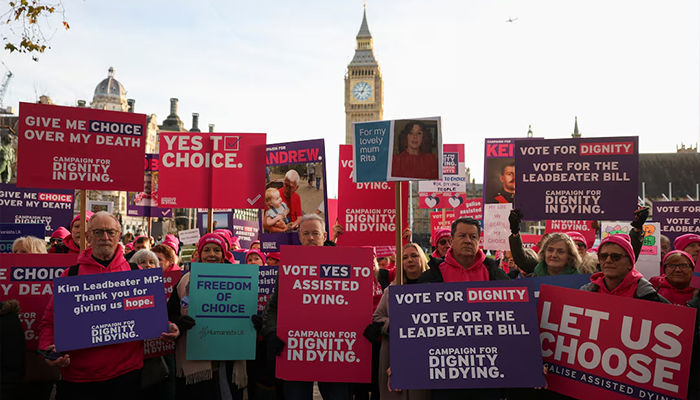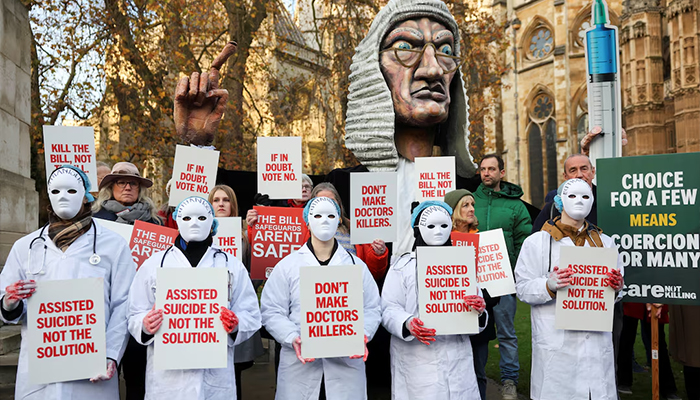British lawmakers give initial support to assisted dying bill
330 lawmakers voted in favour with 275 against "Terminally Ill Adults (End of Life)" bill
Britain's parliament backed a new bill to allow assisted dying on Friday, kicking off months of wrangling over a possible legal change that has sparked a national conversation about dignity in death and end-of-life care.
In an initial approval of the bill, 330 lawmakers voted in favour with 275 against the "Terminally Ill Adults (End of Life)" bill, which would provide for mentally competent, terminally ill adults in England and Wales who are assessed by doctors to have six months or less left to live the right to choose to end their lives with medical help.
It is a historic step towards a change in the law which could see Britain follow other countries such as Australia, Canada and some US states in launching what would be one of its biggest social reforms in a generation.
However, the bill could still be altered or even voted down as it makes its way through both the House of Commons and the unelected upper chamber of parliament, the House of Lords.
"It will be a very thorough process," Kim Leadbeater, the Labour lawmaker who introduced the bill, told the BBC, adding that the process could take another six months.
"There's plenty of time to get this right," she said after more than four hours of often emotional debate in the chamber.
Those in favour of the bill say it is about shortening the death of those who are terminally ill and giving them more control.
Opponents say vulnerable ill people may feel they should end their lives for fear of being a burden to their families and society, rather than prioritising their own wellbeing.
Others expressed concern that there had not been enough time to consider the bill before voting, and highlighted concerns that safeguards applied in other places that have allowed assisted dying have been watered down.
"There will be a further opportunity to improve it if we can, and if we can't, then I hope we'll be able to reject it," Conservative lawmaker Danny Kruger, a leading opponent of the legislation, told Sky News, adding he believed it was "impossible to write a bill that is safe".
Leadbeater has vowed the strictest safeguards in the world. Under the proposals, two doctors and a High Court judge would need to verify that the person had made the decision voluntarily. Pressuring or coercing someone into ending their life would be punishable by up to 14 years in prison.
National debate
The proposal has stirred a national debate in Britain, with former prime ministers, faith leaders, medics, judges and ministers in Prime Minister Keir Starmer's Labour government weighing in on the issue.
Starmer voted in favour of the bill, though several senior members of his government voted against. Polls suggest a majority of Britons back assisted dying.
Foreign minister David Lammy said he voted against the bill as he believed politics should be about "extending life, not shortening it," while former Prime Minister Rishi Sunak, whose Conservatives lost to Starmer's Labour in a July election, said he supported the bill as it would reduce suffering.
The bill would change the law in England and Wales. Scotland is considering a change to its own law to allow assisted dying, while there are no such proposals in Northern Ireland.
People in favour of assisted dying gathered in groups outside parliament on Friday to watch the vote on their mobile phones. When the result of the vote was announced some people hugged, cheered or simply cried.
"I am absolutely delighted, but obviously extremely emotional," said Liz Reed, 38, as she wiped away tears. "I hope this means that something good can come out of something that is really terrible."
Leadbeater expressed gratitude for the passionate but measured nature of the debate, even from those who opposed her bill.
"It's very emotional, but it's emotional for lots of people," she said. "I'm just glad that we've managed to represent those voices here today, and we can take this on to the next stage."
-
All you need to know guide to rosacea
-
Prevent cancer with these simple lifestyle changes
-
Experts reveal keto diet as key to treating depression
-
Skipping breakfast? Here are some reasons why you shouldn't
-
Sciences reveals shocking body response against heart attack
-
Anti-inflammatory teas to keep your gut balanced
-
Emma Stone reveals she is ‘too afraid’ of her ‘own mental health’
-
5 simple rules to follow for smooth, healthy hair














